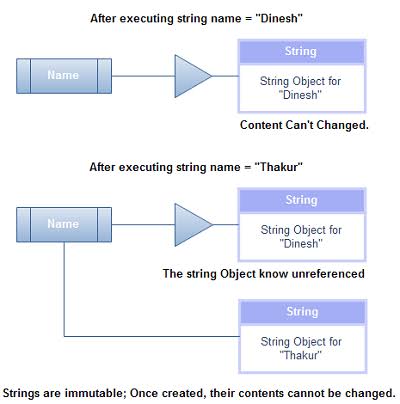Why Are Strings Immutable in Java? Comprehensive Overview for Beginners
Why Are Strings Immutable in Java? Comprehensive Overview for Beginners
Blog Article
Exploring the Advantages of Unalterable Strings in Modern Shows Paradigms
In the realm of contemporary programming standards, the idea of immutable strings stands as a keystone of durable software application growth. The advantages they offer exceed mere convenience; they basically alter the means information is handled within applications. By taking on immutable strings, developers can make certain boosted data stability, boosted thread security, simplified debugging processes, enhanced safety and security steps, and effective performance optimization. These advantages function as a testimony to the extensive impact that accepting immutability can carry the reliability and efficiency of software application systems.
Improved Data Honesty

By preventing the adjustment of string items, immutability removes the risk of unintentional modifications to the information they hold. This not only boosts the safety and security of the details but additionally improves the reliability of the code that counts on these strings.
Immutability additionally supports safer multithreading atmospheres, as concurrent access to immutable strings does not posture the danger of information corruption with synchronised modifications. This home simplifies the procedure of managing strings in parallel programming circumstances.
Basically, immutability serves as a safety guard around the data kept within strings, boosting their stability by ensuring that when specified, their worths stay the same throughout the program's execution.

Enhanced String Security
Unalterable strings enhance the thread safety and security of programs by guaranteeing that as soon as a string object is produced, its value can not be modified. This building removes the risk of concurrent threads trying to modify the very same string simultaneously, which might bring about information corruption or inconsistent states in the program - Why are strings immutable in Java?. In a multi-threaded setting, where several threads access and control data all at once, the immutability of strings supplies a degree of safety and security by ensuring that the data stays unmodified throughout its lifecycle
Streamlined Debugging Procedures
Offered the boosted string safety facilitated by immutable strings, a considerable advantage occurs in the realm of streamlined debugging procedures. Immutable strings, once produced, can not be altered, making it easier to trace the circulation of information and determine the resource of insects in a program. This immutability ensures that strings remain constant throughout the execution of the program, decreasing the likelihood of unanticipated adjustments that might result in errors.
When debugging with mutable strings, designers typically come across problems where a string's worth is customized unintentionally, making it challenging to determine the source of click here now a bug. Nevertheless, with immutable strings, the data remains unchanged, permitting designers to concentrate on assessing the actual reasoning of the code as opposed to finding where and when a string was customized inaccurately.
In addition, unalterable strings streamline the debugging procedure by making it possible for simpler recreation of bugs. Given that unalterable strings do not transform state, programmers can recreate and research pests better, resulting in quicker recognition and resolution of issues within the codebase. This structured debugging workflow ultimately adds to greater software top quality and boosted total advancement performance.

Enhanced Safety Measures
Enhancing data protection and fortifying system stability, the utilization of immutable strings in software application applications adds considerably to enhanced safety and security actions. Unalterable strings also play a vital function in avoiding typical protection vulnerabilities such as buffer overflows and SQL shot strikes, as attempts to control string data at runtime are naturally restricted.
In addition, the immutability of strings improves the predictability of program habits, making it easier to verify inputs and avoid unexpected changes that could compromise security. This predictability simplifies the procedure of bookkeeping and verifying code, enabling designers to identify possible protection loopholes much more successfully. Generally, incorporating immutable strings right into software advancement techniques not just boosts the robustness and dependability of applications but also strengthens their resilience against safety and security dangers.
Reliable Performance Optimization
Structure upon the description structure of boosted security steps achieved through the usage of immutable strings, a key element to consider in software program growth is reliable performance optimization. When dealing with mutable strings, procedures like concatenation or substring creation commonly lead to the production of brand-new string items, resulting in memory expenses and raised processing time. Nonetheless, with immutable strings, these operations can be maximized to improve efficiency. By enabling strings to remain constant and stable, unalterable strings promote far better memory management and caching opportunities, eventually improving the total effectiveness of the software application.
Immutable strings additionally play a crucial duty in multithreaded environments by promoting string security. Why are strings immutable in Java?. Since immutable strings can not be changed when created, they can be shared across strings without the danger of unanticipated modifications, reducing the need for synchronization systems and boosting concurrency. Moreover, unalterable strings streamline debugging procedures as programmers can rely on that a string's value will certainly continue to be constant throughout the program's implementation, eliminating prospective mistakes created by mutable state modifications. Finally, the usage of immutable strings not only enhances protection but additionally substantially adds to the efficient efficiency optimization of contemporary software program systems.
Conclusion
To conclude, the advantages of utilizing immutable strings in modern-day shows paradigms can not be overstated. Boosted information integrity, boosted string safety, streamlined debugging processes, enhanced protection actions, and effective performance optimization all add to the total performance of programs tasks. By including immutable strings right into programs methods, designers can gain from a more dependable and robust codebase.
Immutability, a vital function of strings in programs languages such as Java and Python, makes certain that once a string item is created, More hints it can not be altered or customized.Immutable strings enhance the string security of programs by making sure that when a string item is developed, its value can not be changed. Immutable strings also play a crucial function in preventing typical protection susceptabilities such as buffer overflows and SQL shot attacks, as attempts to manipulate string data at runtime are naturally limited.
By permitting strings to stay stable and continuous, unalterable strings assist in much better memory administration and caching chances, eventually increasing the total performance of the software.
Unalterable strings simplify debugging procedures as developers can rely on that a string's worth will remain regular throughout the program's execution, removing prospective errors caused by mutable state modifications.
Report this page